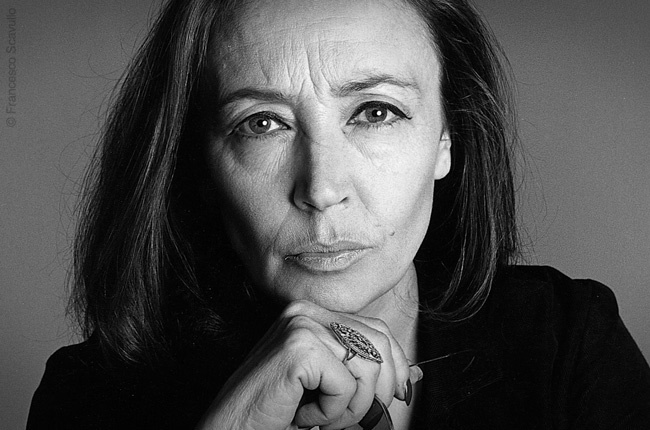The lioness is dead. She didn’t die as a teenage resistance fighter when, as a member of the Tuscan anti-fascist underground, she carried messages and explosives in Nazi Florence. She did not die at the execution wall in Mexico City in 1968, although she was shot and left for dead. She didn’t die reporting from the world’s worst war zones, she was not killed by the powerful who came to tremble at her pen, nor by the fatwa issued by an Islamic jihadist calling for her death.
Margaret Talbot profiled Fallaci in the New Yorker in a carefully crafted and memorable piece entitled “The Agitator”.
“For two decades, from the mid-nineteen-sixties to the mid-nineteen-eighties, Fallaci was one of the sharpest political interviewers in the world. Her subjects were among the world’s most powerful figures: Yasir Arafat, Golda Meir, Indira Gandhi, Haile Selassie, Deng Xiaoping. Henry Kissinger, who later wrote that his 1972 interview with her was “the single most disastrous conversation I have ever had with any member of the press,” said that he had been flattered into granting it by the company he’d be keeping as part of Fallaci’s “journalistic pantheon.” It was more like a collection of pelts: Fallaci never left her subjects unskinned.
Michael Leeden
“She was a freedom fighter to her core, having descended from a proud line of such people. She had an anarchist grandfather and an anti-fascist father (once scheduled for execution) and a mother tough as nails…She was one of the all-time great nonconformists, she fought tyranny wherever she saw it and she challenged evil, especially in the hands of hypocrites, as soon as she detected its rotten odor. She had a rare mixture of that amazing feminine sixth sense for phonies, and a ruthless objectivity that forced her to recognize positive qualities in even the most evil people, as when she spotted a kind of elegance and brilliance in the Ayatollah Khomeini.
Those who know Italy will recognize Oriana as the quintessential Tuscan, right out of the texts: tough, intellectually brutal, brilliantly and eloquently disparaging of anyone who doesn’t meet impossibly high standards, utterly loyal to “the cause.”
 Victor Hansen:
Victor Hansen:
“Rarely has the death of a public intellectual affected me as much as the passing of Oriana Fallaci…The story of her career is well known, but her death, at this pivotal time, was full of paradoxes and yet instruction as well.
Radical Islam is, among other things, a patriarchal movement, embedded particularly in the cult of the Middle-Eastern male, who occupies a privileged position in a society that can be fairly described as one of abject gender apartheid. Islamism is also at war with the religious infidel, not just the atheist-and, in its envy and victimhood, fueled by a renewal of the age-old hatred of the Christian.
But so far, with very few exceptions other than the lion, Christopher Hitchens, the courageous William Shawcross, and a few others, the Left has either been neutral or anti-American in this struggle. And few Christians in positions of influence and respect have publicly defended their faith and the civilization that birthed it.
Wall Street Journal editor Tunku Varadarajan called her
“the toughest nut, the primordial female ballbuster journalist” noting that “She was not always the nicest gal… in fact, she was, by some considerable distance, the most difficult, exasperating and intransigent author I have ever worked with. She was also, by some distance, the most exhilarating, and the most perfectionist.”
“Oriana Fallaci was a modern Tom Paine — a committed partisan of human freedom who gave her enemies no quarter — whether they were Christian or Islamic, old or young, European or otherwise. She could literally smell authoritarian ideologies from across the room.
The Economist
…”abusers of power” both fascinated and repelled her. She dwelled on Yasser Arafat’s swollen belly and his red, fleshy lips; she thought Khomeini the most handsome old man she had ever seen. As she talked to Werner von Braun, a former Nazi who was then directing America’s space programme, she realised that his sweet-sour smell was the same lemon disinfectant soap used by the Nazis in Florence.
She could always sniff out tyranny, and after that September morning in Manhattan, she knew definitively where it lay. Suddenly she was in the front line again, solid with her adored America against the Muslim enemy. “Duty to her culture” required her to write for hours at a stretch in furious isolation, living on cigarillos and on her nerves, to produce books called ” The Rage and the Pride” and ” The Force of Reason”, her “weapons of truth”
She mourned the slow death of Western civilisation, its lack of pride and self-esteem, its cowardice before the Muslim “hordes”. If terrorists were prepared to die for Islam, she would have the passion to oppose them. Her words carried the ring of deliberate provocation, challenging the Islamists to put a fatwa on her and raise a sword to behead her. In which case, before the bastards dared, she would toss back her hair, fix them with a glare and declare, in her best Italian snarl, “Fuck you.”






